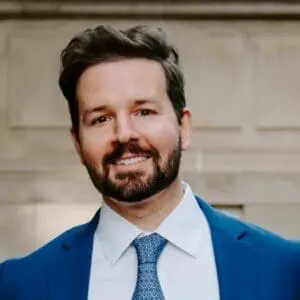Matt Fullen is a clinician on a mission. Trained as a counselor, he never dreamed he’d be spending as many hours poring over survey responses and interview material as he’d be spending with clients. But these days, that’s exactly what’s going on. From his office at Virginia Tech, where he teaches clinical education, he’s plodding away at a particular project. To the outside observer, the work might seem monotonous. But Fullen’s passion for it is undeniable. And like most people with strong convictions, he has a personal story that explains the unexpected detour his career has taken.
In 2012, having received his master’s degree in clinical counseling two years earlier, Fullen was just getting his feet wet, working in a small practice in Ohio. His caseload comprised mainly older clients, a demographic he particularly enjoyed helping. But his work with one particular client he’d been treating long term felt special.
When Fullen met Jane, she was in her late 50s, suffering from a debilitating chronic illness that often left her anxious and depressed. Over the next year, the two experienced a number of breakthroughs together. Fullen not only listened compassionately as Jane explored the root of her distress—social anxiety—but helped her deepen connections with her family to create a strong support system. Outside the therapy room, their work kept Jane steady, even when her illness took a turn for the worse and she was admitted to hospice care.
A few days later, Fullen’s clinical supervisor knocked on his office door. He had bad news: Jane was no longer eligible for treatment. Since being admitted to hospice, she’d gone on Medicare, he explained, and by law, therapists with counseling degrees like Fullen were ineligible for Medicare reimbursement.
Fullen was speechless. In a split second, after all the work they’d done and at a time when she’d need him most, Jane had ceased to be his client—all because of a legalistic hitch related to his licensure.
“There was no space to think about phasing out treatment,” he recalls. “No space for a really nice referral. Just this abrupt change.”
Thankfully, the hospice care unit where Jane was admitted was located in the same building where Fullen worked, which made it easy for him to check on her without the visit qualifying as a therapy session. Jane took the news well. She told Fullen not to worry: she had plenty of nurses to tend to her, she said, plus the family members he’d helped her reconnect with. But it still didn’t feel right to Fullen.
This wasn’t just unfair, he says: “It was an injustice.”
Fullen decided to dig deeper. He knew he couldn’t be the only clinician affected. Indeed, he isn’t. Virtually every mental health professional in the United States with the word counselor in their title is ineligible for Medicare reimbursement, whether a Licensed Professional Counselor (LPC), a Licensed Mental Health Counselor (LMHC), or a Licensed Clinical Professional Counselor (LCPC)—distinctions based on what state issues the license. Counselors with specialty focuses like substance abuse or school counseling are also affected. The same restriction applies to all licensed marriage and family therapists (LMFTs).
As in Jane’s case, this excludes them from working not only with seniors, but with anyone who goes on Medicare because of disability—roughly 15 percent of Medicare users today.
This roadblock hits these therapists financially and interrupts otherwise successful treatments. In instances where a counselor is the only mental health professional available, it also locks suffering people out of getting help in the first place. According to a 2019 report from the National Institutes of Health, roughly 28 percent of older Americans—almost 14 million people—live alone, putting them at an increased risk of loneliness-related health issues like depression, anxiety, heart disease, high blood pressure, and Alzheimer’s. In March, articles in STAT and The American Journal of Managed Care warned that physical distancing during the coronavirus pandemic could exacerbate the loneliness factor for seniors, with potentially disastrous results.
Understandably, addressing this issue has been a high priority for a number of heavyweight organizations, including the National Board for Certified Counselors (NBCC), American Counseling Association (ACA), American Mental Health Counselors Association, and American Association for Marriage and Family Therapists. “This is one of our top priorities,” says Kylie Dotson-Blake, interim president and CEO of the NBCC. “We’ve been in this fight for years.”
It’s also a top priority for Fullen, who, as part of his tenure at Virginia Tech, is midway through a multiyear study focusing on the impact of counselors’ ineligibility for reimbursement. So far, he and a handful of associates have surveyed or interviewed almost 6,000 people: 3,800 practicing counselors and soon-to-be counselors, and hundreds of Medicare recipients.
Almost half of his surveyed therapists say they’ve had to turn away potential clients, desperate for mental health support, because of the law. One-third say they’ve had to refer existing clients out. Another third say they’ve had to adjust their fees as a result, either providing services on a sliding scale, or doing therapy for free.
All of this raises the question: how did this happen? Why are other mental health professionals like psychologists, psychiatrists, and social workers eligible for Medicare reimbursement, but not counselors and LMFTs? And what’s keeping things from changing?
Rich Yep, the CEO of the ACA, wonders the same thing, but he’s got a hunch. Back in 1989, the last time mental health provider regulations in Medicare were updated under the Omnibus Budget Reconciliation Act, which removed restrictions for psychologists and social workers, “counselors were the new kids on the block,” he says. “Other mental health workers had been around for some time,” and thus had more professional clout and lobbying power.
For reference, the American Psychological Association and American Psychiatric Association, the two largest organizations of their kind, were founded in 1892 and 1844, respectively. The ACA and NBCC, by contrast, were founded in 1952 and 1982, respectively.
That might not seem like a big difference in itself, Yep says, but to a budget-minded, often-polarized Congress with relatively little knowledge about counselors’ work to begin with, and more vocal mental health specialties raring to get their own reimbursement authorizations, something had to give.
But the fact that counselors and LMFTs didn’t have powerful advocates in 1989 doesn’t explain why they’re still ineligible for reimbursement today, especially since they now comprise roughly half of all practicing masters-level therapists. Plus, Yep says, they make up nearly half the entire mental health workforce in rural areas, which have a dire need for mental health care and a shortage of Medicare-eligible clinicians.
So, once again, why the holdup in making this adjustment to the Medicare law? “As part of the deliberation process,” Yep explains, “the government looks at who’s licensed and best-suited to treat mental health. I think there’s a fundamental misconception about counselors’ skill set. When people think about counselors, what often comes to mind is school counselors. That’s only one area we serve. Our mission has been to let Congress know exactly what it is we do—that our qualifications not only mirror those of other therapists, but exceed them in many cases.”
Beginning in the early 2000s, the NBCC, ACA, and a handful of other like-minded organizations—collectively known as the Medicare Mental Health Workforce Coalition—introduced the first bills to amend Medicare law to include counselors and LMFTs. All failed to get approval from both the House and Senate—again, Yep speculates, due to misconceptions about counselors’ work, budget concerns, or political bickering.
Any short-term monetary costs, Yep argues, would be outweighed by long-term benefits. He estimates that over the next decade, making counselors eligible for reimbursement could save taxpayers over a billion dollars by rerouting patients from costly emergency services. That estimate doesn’t surprise Fullen, who adds that the number of Medicare-eligible boomers is expected to rise sharply during this time, from approximately 60 million to 80 million adults. With stigma around mental health care increasingly reduced, more of them will be seeking care.
Last January, two bills were introduced in Congress in another attempt to make counselors and LMFTs eligible for reimbursement. The proposed amendment to Title XVIII of the Social Security Act, also known as the Mental Health Access Improvement Act of 2019, currently has 109 cosponsors in the House and 30 cosponsors in the Senate, both Democrats and Republicans.
Now, Yep is hoping that hearing more stories about the consequences of counselors’ omission from Medicare reimbursement will change lawmakers’ minds. Fullen has also lobbied Congress to push through the amendment, using the stories he’s heard from his interviews to put a human face to the problem.
They’re stories about clients like Jane, who had to stop working with their therapists when they went on Medicare. Then there are others, about dropped or potential clients who, with nowhere else to turn, wound up in psychiatric hospitals—which, Fullen adds, costs nearly 12 times as much as traditional therapy. The typical psychiatric patient spends three days in treatment, the equivalent cost of 36 individual therapy sessions. Think about how much progress can be made in 36 sessions!
Fullen hopes legislators will come to come to understand that “there are real consequences here. There’s an economic argument for reimbursement—but there’s a serious human one, too.”
While the prognosis for the bill becoming law once again looks bleak—legislative research team Skopos Labs estimates that the amendment stands a three percent chance of being enacted—Yep, Dotson-Blake, and Fullen are undaunted, and feel positive about the progress they’ve made in rallying support from clinicians and therapist organizations. “We hang on to our optimism pretty tight,” Dotson-Blake says. “In our society, the cost of prevention is more palatable at certain times than others. Now is one of those times.”
Yep agrees. “There’s a momentum here I’ve never seen before,” he says. “Bit by bit, people are starting to realize how important this issue is.” This includes politicians on the campaign trail. Mayor Pete Buttigieg was among the first front-running presidential candidates to explicitly mention the mental health care shortage. That’s huge, Yep says.
Despite the setbacks, Fullen, too, feels optimistic about the future. With the number of counselors and recognition of their contributions growing, the public is bound to become more educated about what exactly it is they do, and to recognize that their work is just as important as that of other therapists. In fact, his survey results suggest that’s already happening.
“An overwhelming number of the Medicare clients I surveyed say they don’t care what your degree or level of education is,” he says. “What they want is to find someone who’s going to be a good fit, someone who understands them. They’re saying things like ‘I want to work with a male counselor, or one who understands LGBTQ or minority issues.’”
So whether it’s this year, or the next, or the next, mainstream attitudes about counselors and who they’re allowed to treat will inevitably shift enough, Fullen says, that a bill like this one will eventually pass.
“Regardless of our clinical specialty or work background, we can all get on the same page and say what’s happening isn’t right,” he says. “This is an issue that everyone can get behind. The people who need our help deserve better.”
PHOTO © ISTOCK.FATCAMERA
Chris Lyford
Chris Lyford is the Senior Editor at Psychotherapy Networker. Previously, he was assistant director and editor of the The Atlantic Post, where he wrote and edited news pieces on the Middle East and Africa. He also formerly worked at The Washington Post, where he wrote local feature pieces for the Metro, Sports, and Style sections. Contact: clyford@psychnetworker.org.













